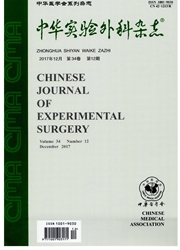

 中文摘要:
中文摘要:
目的观察米非司酮在体外诱导前列腺癌PC-3细胞凋亡的作用机制以及Akt激酶在前列腺癌生长过程中的作用。方法采用Westernblot方法检测不同前列腺癌细胞株癌细胞以及米非司酮作用后PC-3细胞中Akt蛋白磷酸化后蛋白含量,以及相关蛋白的表达量。结果前列腺癌PC-3细胞中Akt磷酸化后蛋白即[p-Akt(Thr^308)和p-Akt(Ser^473)]的含量明显高于激素依赖性前列腺癌LNCaP细胞中的蛋白表达量,其表达量分别为0.27±0.05和0.22±0.07;O.46±0.09和0.37±0.10(P〈0.05)。10μmol/L米非司酮作用于PC-3细胞后p-Akt(Thr^308)和p-Akt(Ser^473)磷酸化蛋白的含量均明显下降,但其中p-Akt(nr3。)蛋白表达量变化尤为显著,4~24h4个时间组蛋白含量分别为0.24±0.08、0.11±0.03、0.05±0.01和0.01±0.00;其蛋白表达量下降速度较p-Akt(Ser^473)快且显著,p-Akt(Serg7。)磷酸化蛋白4~24h4个时间组蛋白含量分别为0.56±0.17、0.42+0.11、0.28±0.09和0.12±0.05。米非司酮作用于PC-3细胞后使Caspase-9、Caspase-3被激活裂解出有活性的激活片段。结论Akt激酶在前列腺癌生长、发展以及激素依赖性向激素非依赖性的转变过程中起着重要作用。p-Akt(Thr^308)蛋白磷酸化水平在Akt磷酸化激活过程中占主导地位,是Akt激活的必要过程。米非司酮抑制前列腺癌PC-3细胞的增殖,诱导细胞凋亡,其可能是通过抑制Akt信号转导通路,从而激活Caspase。
 英文摘要:
英文摘要:
Objective To investigate the cell apoptosis induced by mifepristone in prostate carcinoma cell line PC-3 and the mechanisms involved. Methods Western blotting analysis was used to detect Akt phosphorylation and associated protein expression in different prostate cancer cell line ceils and PC-3 cells treated with mifepristone. Results In PC-3 cells, Akt phosphorylation, that was p-Akt (Thr^308 ) and p-Akt ( Ser^473 ), was significantly higher than the hormone-dependent prostate cancer LNCaP ceils, and their expression levels were respectively 0. 27 ±0. 05 and 0. 22 ±0. 07, 0. 46 ±0. 09 and 0. 37 ±0. 10 (P 〈 0. 05). The p-Akt (Thr^308) and p-Akt (Ser473) phosphorylation in PC-3 cells treated with 10 μmol/L mife- pristone was significantly decreased. The p-Akt (Thr^308 ) phosphorylation was particularly marked, its expression was respectively 0. 24 ± 0.08, 0. 11 ± 0. 03, 0. 05 ± 0. 01 and 0. 01 ± 0. 00 during 4-24 h, and declined rapidly as compared with the p-Akt ( Ser473 ) phosphorylation which expression levels were respectively 0. 56 ±0. 17, 0. 42 ±0. 11,0. 28 ±0. 09 and 0. 12 ±0.05 during 4-24 h. Caspase-9 and easpase-3 were activated into cleavage fragment in the PC-3 eells treated with mifepristone. Conclusion Akt kinase plays an important role in prostate cancer growth, development and hormone-dependent to hormone-inde- pendent transformation. The p-Akt ( Thr^308 ) phosphorylation, which plays a dominant role in Akt phospho- rylation, is necessary in the course of Akt activation. Mifepristone inhibits prostate cancer PC-3 cell proliferation and induces apoptosis by suppressing the Akt signal transduetion pathway and activating caspase.
 同期刊论文项目
同期刊论文项目
 同项目期刊论文
同项目期刊论文
 期刊信息
期刊信息
